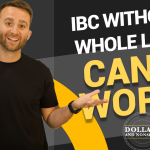Borrowing from life insurance policies can sound daunting to newcomers. There are many things to consider, from policy options to limitations with borrowing. This article answers common questions about infinite banking and outlines everything you need to know about borrowing from life insurance policies.
What is life insurance?
Most people arriving on this website already know what life insurance is, but if you’re a beginner, here is a definition. You can skip this section if you’re not a beginner.
Life insurance is a contract between the policyholder and the insurer. The policyholder pays a premium to the insurer to secure a sum of money (benefit) from the insurer when the policyholder dies. The benefit is intended to ensure financial security for the policyholder’s dependents after death.
What are the different types of life insurance?
There are many types of life insurance. However, two of the most common ones are term life insurance and permanent life insurance.
Term life insurance lasts for a pre-set period, and policyholders are limited to waiting for death to have access to their money. However, term life insurance policies are often cheaper. Standard term-life insurance lengths are 5, 10, 15, 20, 25, and 30 years.
Permanent life insurance is a term used for policies that last a lifetime. The premiums for these policies are higher, but offer more flexibility and control to policyholders. Common types of permanent life insurance include variable, universal, and whole life insurance. Permanent life insurance policies also build cash value that can be borrowed against.
What is infinite banking?
Infinite banking uses life insurance policies to become your own banker. This is best accomplished with whole life insurance.
Whole life insurance, particularly dividend-paying whole life insurance, has a fixed benefit (cash value) that grows tax-free for the duration of the policy and creates a fund that can be borrowed against. Borrowing money from a whole-life policy can accrue interest, but the policyholder often recaptures the interest from the interest and dividends earned in the cash value. This is the process that occurs within banks and other financial institutions.
Can money be borrowed from term life insurance?
Borrowing from term life insurance policies is typically impossible because these policies do not build cash value. Insurance companies use cash value as collateral when a loan is taken from the policy. Without cash value, it is not possible to take out a loan.
What policies can be borrowed against?
Any permanent life insurance policy can be borrowed from. However, certain types are better suited for infinite banking.
With variable life insurance, the cash value is invested into sub-accounts (e.g., equities, bonds, or indexes). Therefore, cash value depends on the sub-accounts performance and cannot be maximized.
With universal life insurance, cash value increases by investing funds into indexes (or keeping it within the policy to earn a low, fixed rate of return). Therefore, like variable life insurance, cash value also depends on performance.
Cash value in a whole life insurance policy is not dependent on the performance of accounts, making it ideal for infinite banking.
How to grow cash value in a whole life insurance policy?
As you pay premiums into a whole life insurance policy, your policy will start to accumulate cash value. The cash value is guaranteed to grow each year and will also earn dividends based on the profits of the company (if you purchased your policy from a mutual life insurance company). You can even design policies that minimize the death benefit and maximize the cash value accumulation by funding large amounts to a “paid up additions rider”.
How to borrow from whole life insurance?
Once cash value has accumulated in the policy, it can be borrowed against. Borrowing processes may differ from company to company, but the process is generally straightforward.
The policyholders contact their insurance company and let them know how much they want to borrow and where to send it. And the insurance company sends the money by check or transfer, typically within a few days.
When a loan is taken from a policy, the insurance company will charge the policyholder interest, which is added to the loan balance. And the policyholder can make payments when they like.
The policyholder’s cash value will continue to grow with interest and dividends even while the loan is outstanding, and there is immense flexibility when paying it back. However, there are some essential things to keep in mind:
- Interest will continue to accumulate until the loan is paid, so taking too much out without paying some back puts the policyholder at risk of exceeding the cash value. If this happens, the policy will lapse.
- Outstanding loan balance will be deducted from the death benefit when the policyholder passes away, which may reduce the amount of money given to the beneficiaries.
- Only some insurance policies allow the policy to grow at the same rate as if there was no policy loan, so that borrowing may affect the cash value growth.
How much money can be borrowed from whole life insurance policies?
A loan that exceeds the cash value within the policy cannot be taken out. Typically, policyholders can take out a loan of up to 95 percent cash value, but this depends on what is allowed by the insurance company.
When can money be borrowed from a whole life insurance policy?
Money can be borrowed from a policy almost immediately, usually after 30 days of starting a policy.
Pros and cons of borrowing from whole life insurance policies
Whole life insurance policies can be an excellent tool for financial freedom. There is a guaranteed rate of return, the cash value grows tax-free, and there are opportunities for additional growth. Policyholders have complete control over the insurance policies and flexibility to cater to personal needs. However, there are some pitfalls to borrowing from one’s insurance policy. These include:
PROS:
- Large upfront and premium costs.
- Long wait time to accumulate enough cash value to borrow from.
- Withdrawing money from the policy while the policyholder is alive may reduce the death benefit.
- Not paying on time can cause a policy to lapse.
- Understanding the ins and outs of borrowing from a life insurance policy can be challenging for people not in the financial field.
- Guaranteed access to money without tax or penalty
- No amortization schedules or minimum payments required.
- No credit checks or application process for the loan.
- Typically very competitive interest rates
- Cash value continues to grow even while there is a policy loan outstanding
CONS:
- Requires self-discipline when repaying since there is not set amortization schedule
- If mismanaged, policy loans can exceed the cash value causing the policy to lapse
- If the policy loan interest is not paid at your policy anniversary, it will add to the loan balance, causing the loan balance to compound.
Those willing to put in the effort that has the financial means will likely benefit from investing in whole-life insurance policies. And there are many resources and professional guidance available to help get you started.
Get Started with Infinite Banking
Contact us at Living Wealth for a free personal consultation if you have a question about infinite banking or borrowing from a life insurance policy.
You can also take our free introductory infinite banking course: Start here. Also, build your knowledge with the Dollars and Nonsense Podcast to learn about infinite banking and wealth-building strategies.






